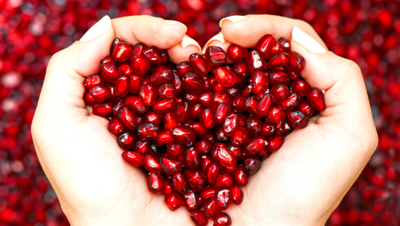
Pomegranates are one of the oldest fruits—you’ll find it mentioned in a number of ancient texts. Throughout history, pomegranates have been celebrated as a symbol of health, longevity, and fertility. How did pomegranates come to hold such a revered place in many different cultures? It’s likely because the fruit is high in antioxidants and other healthful nutrients that promote good health. It’s not just the fruit that is beneficial—there are numerous benefits of pomegranate seeds as well.
Pomegranate seeds are full of phytochemical compounds. These compounds include flavonoids, polyphenols, and antioxidants—all of which can help protect against diseases like heart disease and cancer. Pomegranates are so high in antioxidants that they exceed the levels found in cranberries, green tea, red wine, and blueberries.
One particular compound in pomegranates, punicalagins, has caught the interest of researchers. It seems that punicalagins usher in benefits for both the heart and the blood vessels. These compounds help the body better manage cholesterol and blood pressure levels.
Here’s another exciting benefit that researchers have discovered about pomegranates. These tasty fruits are full of compounds that act as antibacterial and antiviral agents. These two properties are something that could be of great benefit to you. More and more bacteria and viruses are becoming drug-resistant, creating a dangerous situation in our society. It may be necessary to turn to an alternative remedy and pomegranate may be one of the best of those alternative remedies.
Clinical research has shown that pomegranate extracts have a surprising potency when it comes to fighting off a whole range of viral and bacterial pathogens. There are a number of different compounds in pomegranates that have demonstrated antimicrobial activity, but two of these compounds stand out in this regard: ellagic acid and punicalagin. In fact, these two compounds together are even more potent when it comes to the fight against bacteria and viruses.
As an antibacterial alternative remedy, pomegranate extracts have been shown in a number of smaller studies to exert bacterial effects against some highly pathogenic and drug-resistant strains of bacteria. The peel of the pomegranate was found to exert the broadest range of activity against harmful bacteria. However, compounds in the seeds and juice, such as gallic acid and oligomeric ellagitannin, quercetin, and cyanidin were also found to kill off harmful bacteria, which are important benefits of pomegranate seeds.
The next time you’re at the grocery store, pick up a pomegranate. It takes a little effort to get at the seeds, but the payoff is big—you’ll be getting a large dose of bacteria-killing antioxidants and reaping the benefits of pomegranate seeds. You should have no trouble finding fresh pomegranates for most of the year. Try adding fresh pomegranate seeds to your morning bowl of yogurt or your salad at lunch time.
If you can’t bring yourself to patiently peel a pomegranate, you can buy some pomegranate juice. Pomegranate juice is also full of antioxidants and vitamin C as well. Pomegranate extract is also available in most health food stores.
Sources:
Howell, B., et al., “The Pomegranate: Effects on Bacteria and Viruses That Influence Human Health,” Evid Based Complement Alternat Med 2013; 2013: 606212.
“Pomegranate,” MedlinePlus web site; http://www.nlm.nih.gov/medlineplus/druginfo/natural/392.html, last accessed Jan. 21, 2014.













